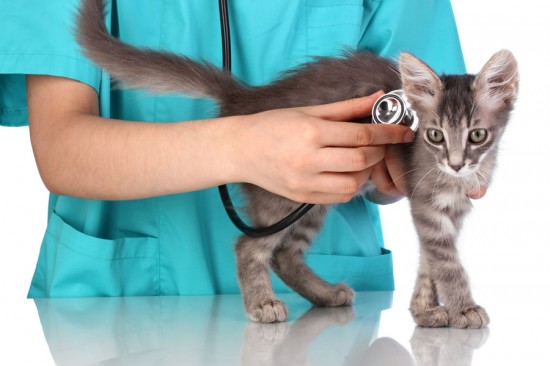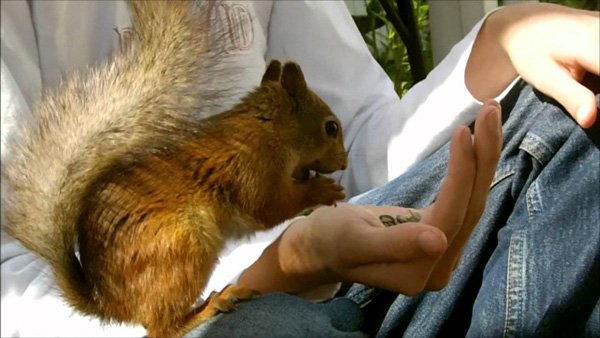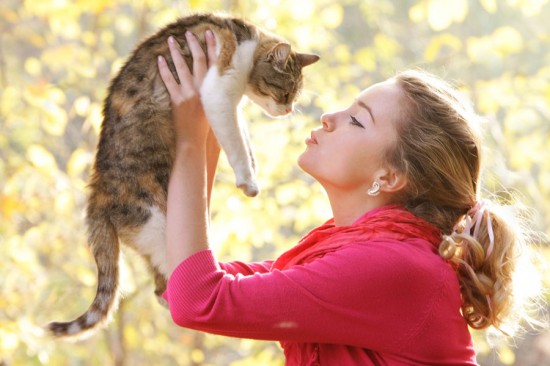

Many cats seem to regurgitate their food sometimes after they’ve eaten, and there can be a variety of reasons for this. If the sickness is accompanied by other symptoms such as diarrhoea, fever, lethargy or if they are passing blood, it could be indicative of a number of problems, some of which may be quite serious. In situations like this you need to take Puss to see your vet as soon as possible as genuinely ill cats can go downhill very rapidly - cats do not ‘suffer in silence’ and you will certainly know if your cat is seriously unwell.
However, if all you see are piles of regurgitated food, there is probably no cause for alarm, especially if your cat is as active as ever and seems well in himself, and is otherwise acting as normal. Frequent bouts of sickness are not unusual for some cats, and it often seems to be those of Siamese or Oriental background that are most affected this way, although any unusual behaviour should be properly investigated.
If it appears that Puss may have eaten something he certainly shouldn’t have, such as a toy, a woollen article, an elastic band, or maybe copious amounts of paper (and yes, cats will sometimes ingest all of these!), and you see some evidence when he is sick, this may also mean a trip to see the Vet, in case there are still particles of the offending articles still in the intestine, or, worse still, tied round it. If you see any traces of such items making their way out of his rear end, do not be tempted to pull them through as you will almost certainly cause some damage to the intestine – your Vet needs to deal with this situation, possibly under a general anaesthetic.
In the wild, cats will dispose of the inedible parts of their diet, such as beaks, claws and fur, by means of being sick, and it can sometimes be something like this that causes your domestic cat to vomit. They are not ill, but may be getting rid of the indigestible parts of any wildlife that they have killed and eaten. Because cats will often chew grass and other garden plants if they go out, the same will apply there too, as cats are not omnivorous and their basic dietary needs consist mainly of meat and fish, sometimes augmented by small amounts of starch such as rice and cereal. You should be able to see if this is the case when you have the job of clearing it up.
At home there can be several explanations for what appears to be a fairly violent bout of vomiting after your cat has eaten. You may think he is in extreme distress as he will make a loud retching sound announcing that he is about to be sick, and for some reason will often be seen taking some steps backwards at the same time. But seconds later he will have bounced back, and be ready to play – or even head back to the food bowl! In situations like this, cats may bolt their food down if you have fed them a little later than usual, or, if you have more than one cat, there may be an element of competition as each cat tries to get at least their share of the bowl of food. It’s difficult to train cats to eat their bowl only, without helping themselves to those belonging to their housemates, and you should be watchful at mealtimes that nobody does actually miss out. If you appear to have a ‘boss cat’ that has first picking of any food put down, it may be as well to remove him to another room once you feel he has eaten his fair share of supper.
Some cats don’t get on well with dried food and it seems to upset their digestive systems, so if this is the case, you would do best not to feed it at all, or if you have another cat for whom this is his preferred meal, don’t leave dried food down all day, and remove it as soon as those who get on well with it have finished. It’s not just dried food that can upset feline stomachs as it can also be wet food that does it. Some cats find pouches and trays of meat in gravy too rich for them, others seem to have a reaction to fish, and a few may have a genuine allergy to some food. If you change your cats diet and introduce a new variety of food, try and do it gradually, as a sudden change can invoke sickness. With proprietary cat food, you may not get good quality cat food if you buy the cheapest you can find – if you are on a tight budget, it’s worth looking out for offers on the quality food, and then buying enough to last a few weeks. Most cat food bought in pet stores and supermarkets has a long shelf life, but check first that it isn’t on special offer because it has nearly reached its expiry date, and then store it as directed on the packaging.
The majority of cats don’t get on well with cows’ milk, and even helping themselves to the remains of your breakfast cereal bowl can be enough to make them sick. It’s best to keep all cats away from this kind of milk, and they should certainly be given a bowl of fresh drinking water, rather than the traditional saucer of milk, even as a treat. It’s now possible to buy sachets of milk specially formulated for cats from pet stores, although most cats are not too impressed by them.
Other things that can make cats sick are hairballs, especially with cats that have long or semi-long coats, and if this is the case, you will generally see the evidence amongst what your cat has produced. It’s very important to brush and comb all cats regularly to get rid of loose hair, and this is particularly important with the longer coated varieties.
If you notice that your cat is being sick several times a week, or the frequency has increased, it’s probably best to take them to the Vet just to make sure there is no underlying problem, although in serious cases you will usually see other symptoms as the cat will appear unwell and try and hide away in a quiet corner.
 How To find A Luxurious Cattery For Your Cat?
How To find A Luxurious Cattery For Your Cat?
How To find A Luxurious Cattery For Your Cat?
How To find A Luxurious Cattery For Your Cat?
 Health Problems Common To The Doberman Pinscher Dog Breed
Health Problems C
Health Problems Common To The Doberman Pinscher Dog Breed
Health Problems C
 The First Riders - The History Of Horse Riding
The First Riders
The First Riders - The History Of Horse Riding
The First Riders
 Avoiding The Over-humanisation Of Your Cat
Avoiding The Over
Avoiding The Over-humanisation Of Your Cat
Avoiding The Over
 Keeping Birds Of Prey
Keeping Birds Of
Keeping Birds Of Prey
Keeping Birds Of
Copyright © 2005-2016 Pet Information All Rights Reserved
Contact us: www162date@outlook.com